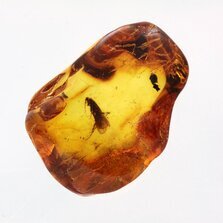David Tickner's Blog, page 13
June 13, 2023
Electric, Electron
 Did you know that the words electric, electricity, electrician, and others all come from an ancient Greek word meaning a type of petrified tree sap—amber, to be specific.
Did you know that the words electric, electricity, electrician, and others all come from an ancient Greek word meaning a type of petrified tree sap—amber, to be specific.The Greeks noticed that if you rubbed a piece of amber on your toga and then touched someone, a small spark would jump from you to the other person. The Greek word for amber at that time was elektron.
Greek elektron is the source of Latin electrum and electricus (resembling amber). The words electric and electricity first appear in English in the 1640s as scientists worked to learn more about that little spark associated with amber.
The word electrician, a scientist concerned with electricity, appears in English in 1751. The word electrician, a technician who works with electrical systems and appliances, does not appear until 1869.
The word electron (electric + ion) was coined in 1891 by an Irish physicist, George Stoney.
The English word ion had been created in 1834 by the English scientist, Michael Faraday, from Greek ion (a form of the verb ienai = go) and the Proto-Indo-European root ei (to go). Ions are so called because they move or go toward the electrode of an opposite charge. Faraday also coined the word electrode from electro + Greek hodos (a path, track, road).
Anyway, the next time you talk with an electrician feel free to mention that the word electrician comes from ancient words meaning petrified tree sap. Or, maybe not.
Reference: Online Etymological Dictionary, https://www.etymonline.com/
Published on June 13, 2023 07:51
June 9, 2023
Eve
 The origins of the name Eve are found as much in ancient myths and stories as in the histories of words and languages.
The origins of the name Eve are found as much in ancient myths and stories as in the histories of words and languages.The name Eve is a Latin word which has its origins in Hebrew hawwah (a living being; the verb ‘to be’), hawa (life; to live), and chavah (to breathe) which is also Hebrew name Chavah. The equivalent word in Aramaic is hayyin and in Arabic the equivalent is hayya (air, breath). Words such as eve, even, evening, and others have different origins and meanings.
The Online Etymological Dictionary states, “…hawwah is probably based on folk etymology or an imaginative playing with sound… [another proposal is that the name Eve] sounds suspiciously like the Aramaic word for serpent.” The ancient Hebrew word for serpent is hewya.
Wikipedia tells us that hawwah may be related to the gods and goddesses of the Hurrian people who lived in the ancient Middle East ~5,000 years ago. There is evidence that these gods and goddesses were worshipped in Jerusalem in the Late Bronze Age ~3,500 years ago. Another source suggests that the story of Hawwah (Chavah, Eve) may have originated in the Sumerian myth of Ninhursag, one of several earth mother and healer figures who are described as fashioning humankind from clay. Another source states that one of Ninhursag’s daughters was named Ninti which means both ‘the lady of the rib’ and ‘the lady of life’.
In brief, the name Eve has connections and speculated connections to ancient stories of living and breathing, life giving and healing.
Image: The Rod of Asclepius, the ancient Greek symbol of medicine, healing, and healthcare, consists of a single serpent entwined around a staff. I was tempted to use an image of Eve from Wikipedia, the 1889 painting by the Polish artist Pantaleon Jozef Szyndler, but after careful consideration I thought that I better not eat that apple.
Reference: Online Etymological Dictionary, https://www.etymonline.com/
https://en.wikipedia.org/wiki/Eve
https://en.wikipedia.org/wiki/Ninhursag
Published on June 09, 2023 16:17
June 5, 2023
Andragogy, Pedagogy
 During the 1920's, two brothers taught at the University of Prague in the Faculty of Education. The younger brother, Peter, was an expert in children’s education; the older, Andrew, specialized in the emerging field of adult education. They met regularly to discuss the differences and similarities between their respective fields of study.
During the 1920's, two brothers taught at the University of Prague in the Faculty of Education. The younger brother, Peter, was an expert in children’s education; the older, Andrew, specialized in the emerging field of adult education. They met regularly to discuss the differences and similarities between their respective fields of study.Their students were part of these energetic and enthusiastic discussions which often occurred in the coffee houses and pubs of Prague, some of which were meeting places for Peter Gogy’s students and some for Andrew’s.
Over time, two schools of thought developed: Petergogy (the study of children’s education) and Andrewgogy (the study of adult education). These terms, like Darwinism or Marxism also named for their founders, would have continued except for the modesty of Peter and the aesthetics of Andrew. Peter didn’t want a theory named after him; Andrew simply thought that such names were not elegant: Gogyism?! Hmmm. Who would want to call themself a Gogyist? What to do? The Gogy brothers resolved to give their theories more scholarly and credible scientific names.
Peter reminded Andrew that their family name, Gogy, came from Greek agogos (leader). Peter combined agogos with Greek paido (child) and came up with the word paidagogos (in English, pedagog and pedagogy). Andrew reminded Peter that the ancient Greek word paidagogos referred to the family servant who led or took the children to school. Andrew’s view was that a teacher of adults was more like a servant or facilitator than a leader. Of course, this set off a whole new round of debate and discussion between themselves and their students.
Andrew, who thought of adults as ‘mankind’, turned from paidagogos to the Greek word for man (andro). He suggested that adult students, responsible for their own learning, could be considered an andragogus (in English, andragog or andragogy).
Peter pointed out that andragogus only referred to men—what about women? Andrew puzzled over this. He considered androgynogogy (i.e., Greek andro = man + Latin gyne = woman) as well as androidogogy (from android, an 18th century word) but neither term caught on. As it turned out, andragogy is the word that stuck. Some have asked why Andrew didn’t consider using Greek anthropos (human being) and coin the term anthrogogy.
The Gogy brothers would have been pleased to learn that their distant Scottish cousin Hugh Gogy had developed a system of self-determined learning (heutagogy) in the 1990s while living far from formal schooling in the Highland countryside.
My apologies to Malcolm Knowles.
Reference: Online Etymological Dictionary, https://www.etymonline.com/
Published on June 05, 2023 07:56
June 1, 2023
Colander
 When you use your kitchen colander, do you ever think of fishing? The word colander has its origins in Latin colum (wicker fishing trap or net, strainer), a word of uncertain origin.
When you use your kitchen colander, do you ever think of fishing? The word colander has its origins in Latin colum (wicker fishing trap or net, strainer), a word of uncertain origin.Colander, a vessel perforated with little holes to allow liquid to run off, appears in English in the mid-14th century as coloundour, from Latin colatorium (strainer), colare (to strain), and colum.
Image: Willow eel trap: Veronica Rechten, Pinterest
Reference: Online Etymological Dictionary, https://www.etymonline.com/
Published on June 01, 2023 09:32
May 29, 2023
Theory
 What is your view of theory?! Would you say that nothing is as practical as a good theory? Or would you call upon an old proverb: Action will remove the doubt that theory cannot solve?
What is your view of theory?! Would you say that nothing is as practical as a good theory? Or would you call upon an old proverb: Action will remove the doubt that theory cannot solve?Do you like going to the theatre to see a movie or a play? You might be surprised to learn that the words theatre and theory have the same origins.
The word theory, from the Proto-Indo-European (PIE) root dhau (to see), is the source of Greek theatron (to see or to view), theatrum (theatre), and the English word theatre, a place where we go to see something in order to learn or to be entertained (Notice that -tre follows the Greek spelling rather than -ter).
Greek theatron is also the source of Greek theoros (spectator) and theoria (contemplation, speculation, theory). A person (theoros) who looked thoughtfully or with intention at some thing or some experience could learn or understand (theoria).
Theoria passed unchanged into Latin, came to Old French as theorie, and in the 1590s came to English as theory (conception, mental scheme). By the 1610s, theory meant the underlying principles of a science or art.
By the 1630s, theory also meant an intelligible explanation for something which is based on observation and reasoning, a plausible explanation or belief about something.
When we look carefully at or beneath a set of facts or a body of evidence, what do we see? We see, or can see, theory.
There is another connection to PIE dhau (to see). Not only is dhau the source of the word theory, dhau is also the source of Greek thauma (a wonder or a miracle). Sometimes understanding and learning something can seem miraculous, an unexpected “Aha! I see. Now I get it!”
Reference: Online Etymological Dictionary, https://www.etymonline.com/
Published on May 29, 2023 08:40
May 22, 2023
Girl, Boy
 The origins of the words girl and boy are unknown.
The origins of the words girl and boy are unknown.Girl
The origins of the word girl are possibly in Old English gyrele and Proto-Germanic gurwilon, words meaning a girl or a boy. Another source suggests that gryele comes from other Germanic words which denote young animals, children, and other immature creatures, or to refer to someone becoming childlike in their dotage. https://www.etymonline.com/search?q=girl
In the early 14th century, the English word gyrle or girl referred to a child or young person of either sex but more frequently of females. By the late 14th century, the word girl specifically meant a female child and, by the mid-15th century, the word girl referred to any young unmarried woman.
Boy
The origins of the word boy are possibly from Greek boeiai dorai (ox hides), Latin boia (leg iron, yoke, leather collar), and Old French embuie (someone fettered). Such words suggest that boy referred to a servant, an attendant, or a slave; for example, Italian ragazzo, French garcon, Greek pais, and Middle English knave. Even today, the call “Garcon!” heard in a French restaurant with the snap of the fingers is a call for service or for the server.
In the mid-13th century, the English word boie meant a servant, commoner, or knave (usually a young male). In the early 14th century, a boie was a rascal, ruffian, knave, or urchin. By the mid-14th century, boy began to refer to a male child before puberty.
Some sources suggest that Middle English boi meant a servant or a churl or, sometimes, a devil. Another source suggests that boy is a blend of boi (an evil spirit) and bo (a baby’s word for brother). https://www.etymonline.com/search?q=boy
Pink and Blue
What about the use of pink and blue to designate infant girls and boys? Has this always been the case? The short answer is No. “Pastel colors for baby clothing—including blue and pink—were introduced in the mid-19th century, and they didn’t become sex-specific colors until the 20th century.” Even in the early 20th century, there was a trend for boys to wear pink and girls to wear blue. Only in the 1940s was this trend reversed—blue for boys and pink for girls . https://www.britannica.com/story/has-pink-always-been-a-girly-color
Reference: Online Etymological Dictionary, https://www.etymonline.com/
Published on May 22, 2023 20:01
May 18, 2023
Cheez
 “So, who is the Big Cheese around here?” Where did we get the idea of calling someone a ‘big cheese’?
“So, who is the Big Cheese around here?” Where did we get the idea of calling someone a ‘big cheese’?Cheez or chiz is an Urdu word meaning ‘thing’. In early 19th century India, cheez was used by English colonial officials to mean a big thing or big event. Later, cheez came to mean an important person who holds the most power or influence in any situation. At that time, there was no need to say ‘big cheez’—a cheez was a cheez.
Over time, cheez, similar in meaning to terms like ‘top dog’ or ‘big shot’ or ‘head honcho’, came to be spelled in English as cheese. By the 1920s, the term ‘big cheese’ appeared meaning the same as cheez.
By the way, honcho is a Korean word meaning someone in charge or the head of a team or organization—to call someone the head honcho is like calling them the head head. But that’s another story.
Reference: Online Etymological Dictionary, https://www.etymonline.com/
https://www.urdupoint.com/dictionary/urdu-to-english/cheez-meaning-in-english/88981.html
https://idioms.thefreedictionary.com/big+cheese
https://dictionary.cambridge.org/dictionary/english/big-cheese
Khan, Vaseem. (2019). Bad day in the vulture club.
In this Baby Ganesh Agency novel, Inspector Chopra and his elephant sidekick investigate the death of one of Mumbai's wealthiest citizens, a murder with ramifications for its poorest.
Published on May 18, 2023 10:22
May 14, 2023
Mother
 The word mother is a classic example of a word that has come to English and other Indo-European languages almost unchanged from its ancient Proto-Indo-European (PIE) origin: the PIE word for mother is mater.
The word mother is a classic example of a word that has come to English and other Indo-European languages almost unchanged from its ancient Proto-Indo-European (PIE) origin: the PIE word for mother is mater.PIE mater is the source of Proto-Germanic moder (the source of Old Saxon modar, Old Frisian moder, Old Norse modir, Danish moder, Dutch moeder, Old High German muoter, and German mutter. Other related words for mother include Latin mater, Old Irish mathir, Lithuanian mote, Sanskrit matar, Greek meter, and Old Church Slavonic mati.
Some linguists suggest that the easiest sounds a new-born infant can make are mmm and ma and mama (food may be involved).
Some related expressions include mother tongue from the late 14th century, mother-wit (common sense) from the 15th century, mother earth and mother country (from the 1580s), and mother nature (from around 1600).
Happy Mother’s Day!
Reference: Online Etymological Dictionary, https://www.etymonline.com/
Published on May 14, 2023 10:00
May 11, 2023
Velcro
 In 1941, a Swiss engineer, George de Mestral, noticed burs caught on his socks after a hike in the Alps. Rather than seeing these burs as a nuisance, and being an engineer or just plain curious, he looked at them under a microscope. He saw hundreds of tiny hairlike hooks on the burs.
In 1941, a Swiss engineer, George de Mestral, noticed burs caught on his socks after a hike in the Alps. Rather than seeing these burs as a nuisance, and being an engineer or just plain curious, he looked at them under a microscope. He saw hundreds of tiny hairlike hooks on the burs.Maybe he said to himself, “Oh, isn’t this interesting.” And that might have been that. But he likely also asked himself, “What can I do with this information?”
He invented a fastener which he originally called ‘locking tape’. Initially made with cotton, the fastener was later made from nylon and polyester. In 1955, he patented this tape under the name Velcro, a combination of French velours (velvet) and crochet (little hook). In brief, vel(vet) + cro(chet).
Reference: Online Etymological Dictionary, https://www.etymonline.com/
https://en.wikipedia.org/wiki/Velcro
Published on May 11, 2023 08:08
May 7, 2023
Respect
 “I spy, with my little eye, someone who is . . .”
“I spy, with my little eye, someone who is . . .”The word respect has its origins in the PIE root spek (to spy, to peer, to watch closely, to look carefully), Greek skopein (to observe, to see; in particular, to see without judgement or to see without changing what is seen), and Latin specere (to see or to look at).
The word respect (regard, consideration) came to English in the late 14th century from Latin respectere (to review, to look back, to look again carefully)—Latin re (back) + specere (to see, to look at). In the late 14th century, respect meant the feelings of esteem excited by the actions or attributes of someone or something. Respect also meant courteous or considerate treatment due to personal worth or power.
The verb ‘to respect’ came to English in the 1540s meaning to regard or to notice with special attention, from French respecter (look back; respect) and Latin respectere. The use of ‘to respect’ meaning to treat with deferential esteem or to regard with some degree of reverence is from the 1550s.
Consider respect in terms of Greek skopein, the origin of the word scope. We look through the lens of a telescope to bring faraway objects closer. We look through the lens of a microscope to see into the details of an object. We adjust the instrument’s focus in order to see clearly.
When we look at something or someone, we look through the lens of our values and our attitudes. We focus or re-focus. As such, respect is an act of intention not just an act of seeing. We look with the eye of respect.
In brief, respect is an action, the act of seeing, looking twice, seeing again. Respect is an act of perspective before it is an act of understanding.
Latin specere is the origin of words such as aspect, introspective, perspective, prospector, spectacle, spectacular, spectator, spectre and spectral, spectrum, speculate and speculation, speculum, and spy.
Image: George Redgrave, https://www.flickr.com/photos/19396658@N00/14560405563
Reference: Online Etymological Dictionary, https://www.etymonline.com/
Published on May 07, 2023 10:35



